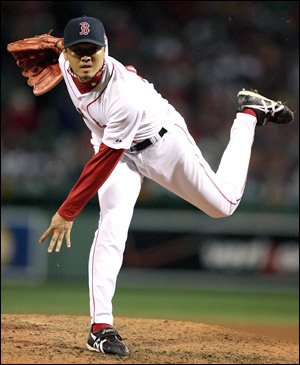The untouchables
The cool New England night had the feel of a farewell of sorts. As he marched to the dugout after his outing in Game 2 of the World Series was complete, Curt Schilling gazed into the stands and -- with the Fenway faithful on its feet -- tipped his hat as a wistful smile danced across his lips. The old pitcher's night was over. It was Pap-ajima time.
In Game 1, it was the Boston lineup that shined in a historic performance. Game 2 belonged to the Red Sox's pitchers, who dominated the somnolent Rockies lineup for a second consecutive night. A day after the 13-1 thrashing in Game 1, the Red Sox showed they are built to win the close games, too. Yes, they have the game's most dominant starter in Josh Beckett, and yes, they have the fearsome lineup of mashers, but Boston also boasts the best late-inning combo in Hideki Okajima and Jonathan Papelbon. The Rockies were introduced to the pair in Game 2. "This was the Pap-ajima show tonight," said Schilling after the game.
After Schilling finessed his way through 5 1/3 innings, again relying on guile and not gas, Okajima and Papelbon, who recorded the last 11 outs of the game by allowing just one baserunner, were untouchable. The country knows Papelbon, the gregarious, Riverdancing All-Star closer who is starting to build his own October legend (he has pitched 7 2/3 shutout innings in five postseason games). Now meet Oki, who last winter was Boston's less heralded Japanese import, his arrival overshadowed by the $103 million the Red Sox showered on Daisuke Matsuzaka. But here in October, the left-hander has proved to be a more valuable asset in Boston's World Series run.
"This is our first viewing of him," said Colorado manager Clint Hurdle. "We've watched a lot of tape of him. We watched him pitch obviously most recently against Cleveland. He's very effective. He can speed you up, slow you down. He throws strikes, he's got some deception."
"It's one thing to watch him on TV," said Todd Helton of Okajima. "It's another to face him in person. He's not easy to get used to."
After his dazzling 2 1/3 innings of work in Game 2, in which he showcased his pinpoint 89 mph fastball and devastating splitter (he K'd four hitters as 20 of his 28 pitches were strikes), the 31-year-old from Kyoto with the unconventional delivery has pitched 8 2/3 scoreless innings against the Angels, Indians, and Rockies this postseason. In the sixth, Boston clung to a 2-1 lead with one out and men on first and second. Schilling exited, and Okajima arrived: He induced a ground ball from Garrett Atkins, then struck Brad Hawpe out on a filthy 84 mph splitter.
"If Oki doesn't throw as many strikes as he did, he wouldn't have been able to stay out there for as long as he did, but he was so good," said Boston manager Terry Francona. "His command was spectacular. That set up the whole game, him being able to go out in the eight and keep their two fastest runners [Willy Taveras and Kazuo Matsui] off base."
Said Papelbon, who pitched a 1-2-3 ninth (11 of his 13 pitches were high-90s fastballs) and turned in one of the game's biggest plays when he picked off Matt Holiday in the eighth, "It all started with Okajima coming out and doing what he did. We're a group that obviously loves to have fun, and obviously we all love challenges. I think we all feed off of each other. That's what we did tonight."
The Rockies limp to Denver down 2-0 but hopeful the thin air will give them new life. "We haven't played well," said Helton, "but we know everything can change very quickly." They also now know this: They better get a lead early Saturday night because the game is all but over when it's Pap-ajima time.





